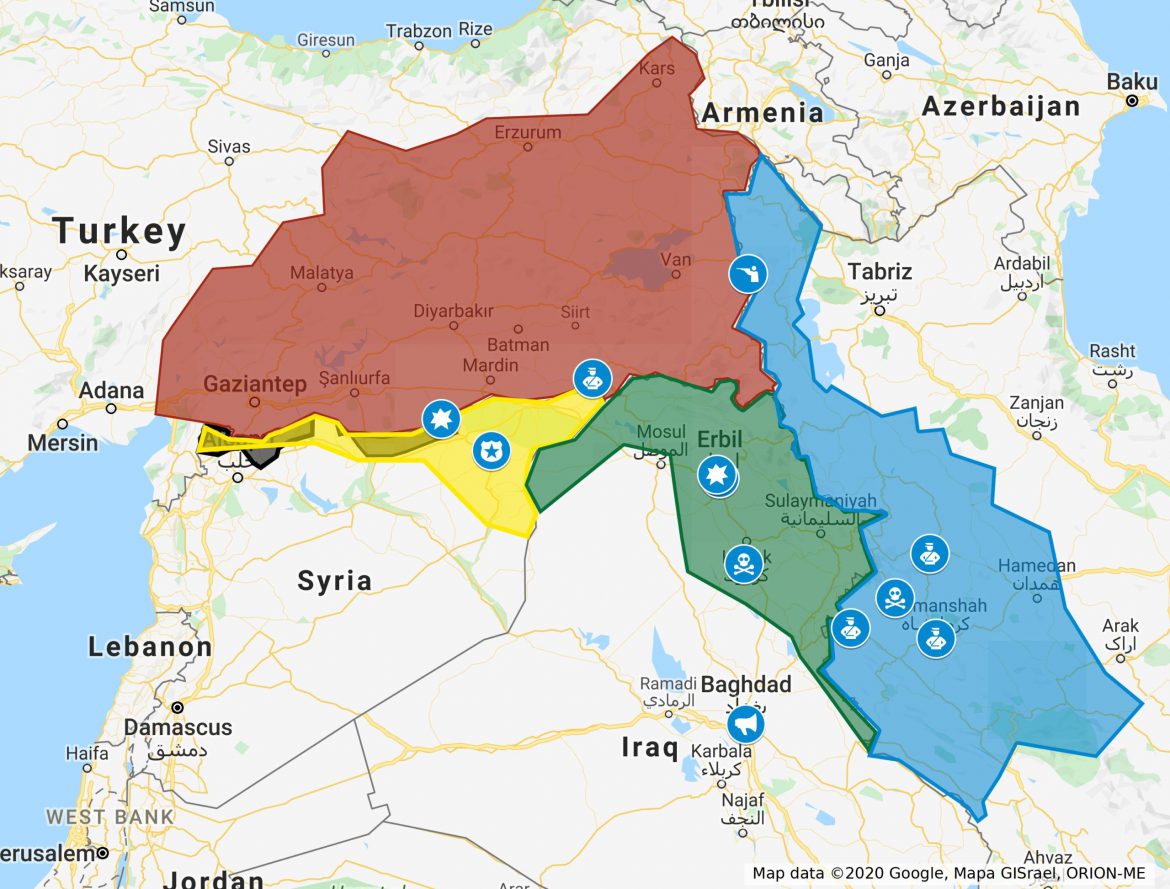1.1K
Iran
- The Iranian regime began 2020 by intensifying its continuing crackdown on Kurdish political activity. In Sanandaj, the Islamic Revolutionary Court sentenced a political Kurdish prisoner named Hoshmand Alipour to death. Alipour was charged with “rebellion” after being arrested with another political prisoner named Mohammed Qadir. Qadir, who is from Saqqez, was charged by the same court with “rebellion” and sentenced to five years in prison. Also, in Sanandaj, a Kurdish environmental activist named Homian Bahmani was sentenced to two years and six months in prison. According to the Kurdistan Human Rights Association (KMMK), Bahmani was charged with “membership of the Kurdish opposition party” and his original sentence of five years was reduced following an appeal. Meanwhile, Iranian authorities arrested an activist named Madhi Moradi in Sanandaj on Friday. Moradi was previously sentenced to two years in prison and received a suspended death sentence in 2013 for “membership of a Kurdish party.” Moradi’s most recent arrest makes it likely he will face execution. Simultaneously, Iranian authorities arrested Abdulrahim Nazri in Kermanshah, Gabriel Azizi in Sarpol Zahab, and a writer and poet named Aram Fathi in Marivan. The Iranian regime arrested around 400 Kurdish activists in 2019.
- The body of a Kurdish man named Hashim Muradi was found near a river in Javanrud. Marudi is the latest person to go missing and be found dead after participation in the mass protests which began on November 15. Murad, like many other murdered protesters, also appears to have been tortured.
- In the first week of 2020, Iranian border guards severely wounded two Kurdish border porters (Kolbars) near Khoy city. The total number of Kolbar casualties in 2019 was 71 killed and at least 138 wounded, with the Iranian regime directly responsible for 90% of the deaths and the other 10% caused by mines and avalanches.
Iraq
- The Kurdistan Region Presidency, in response to increased tensions between the United States and Iran following the death of Quds Force commander Qasem Soleimani, released a statement urging both nations “to solve their problems through dialogue and to respect Iraq and its sovereignty.” The statement also rejected the attacks on the US troops in Kirkuk and Qaim by the Iranian backed militias and took a somewhat conciliatory tone towards Soleimani and Abu Mahdi al-Muhandis in saying, “As a result of these events, General Qasim Solaimani, the commander of the Quds Force, and Abu Mahdi Al-Muhandis, Deputy Leader of the Popular Mobilization Force, and their comrades lost their lives while both of them played a prominent role in the fight against ISIS terrorists in the past few years.” Meanwhile, the Iranian Consul in Erbil Nasrallah Rashnoudi told Rudaw that they were expecting a greater reaction to Soleimani’s death from Iraqi Kurdistan. On Monday, the President of the Kurdistan Region Naichervan Barzani released a condolence message addressed to the Iranian Supreme Leader Ali Khamenei.
- Nearly all of the Kurdish lawmakers serving in the Council of Representatives of Iraq (CoR) boycotted a session in which the CoR voted to request the Iraqi government expel foreign forces from Iraq. Bashir Hadad, the Kurdish second deputy speaker of the CoR, attended the session for reasons related to protocol vice support for the measure. Additionally, though the vast majority of Sunni lawmakers joined the Kurds in boycotting the session, nine voted with the Iranian-backed Shiite blocs in support of the measure.
- On Sunday night, ISIS (Da’esh) terrorists killed three Iraqi soldiers and kidnapped a fourth in Kirkuk’s Daquq District. The region, often referred to as the “Disputed Territories,” has seen a significant uptick in Da’esh activity since Iraqi forces and Iranian-backed militias expelled Peshmerga forces on October 16, 2017.
Syria
- Turkish-backed jihadists continued assaulting the rural areas surrounding Ain Essa in an attempt to seize control from the Syrian Democratic Forces (SDF), with attacks occurring in the Khalida and Hoshnan villages. The SDF then released statistics inferring the jihadists were using heavy weapons to target civilian areas during their continuing incursions into SDF-held territory. Meanwhile, attacks by Turkish-backed jihadists in the vicinity of the Christian town of Tal Tamer were limited to the al Bab and ar Rashidiya villages. On another note, the SDF announced it foiled a significant Da’esh attack in the outskirts of Deir ez Zour and claimed it confiscated mortars and IEDs intended for use in terrorist operations.
- The SDF announced the capture of three Russian Da’esh brides in al Hasakah city who had escaped with their children from al Hawl camp. Al Hawl camp currently houses 71,000 displaced persons, of which around 40,000 are Da’esh family members, and has seen an increasing number of escape attempts following the Turkish invasion of northeastern Syria.
Turkey
- Turkish authorities prevented council members from attending meetings in Sirnak Province’s Cizre and Idil districts and Diyarbakir’s Sur District. The Turkish government had previously removed elected Kurdish mayors and replaced them with trustees in these districts. Thus far, Turkish authorities have removed 32 Kurdish mayors and co-mayors and a number of local council members in Turkey’s Kurdish region since local elections were last held in March 2019.
- The pro-Kurdish Peoples’ Democratic Party (HDP) bloc in the Grand National Assembly of Turkey voted against the deployment of Turkish forces to Libya. That said, the motion passed 325-184 due to support from the ruling Justice and Development Party (AKP) and Nationalist Movement Party (MHP). HDP Vice President Saruhan Oluç responded to the vote by stating, “All the opposition parties have taken a common stance. Outside the parliament, social opposition is also very determined. The civil society had said ‘no’ to this motion. The Libyan motion is actually a step towards the war waged by the AKP-MHP government.”

